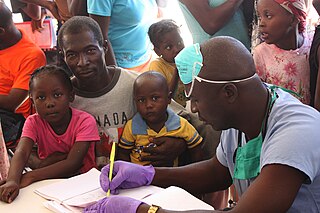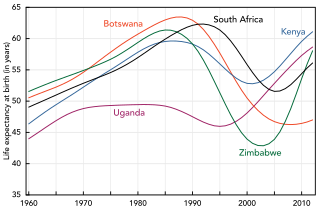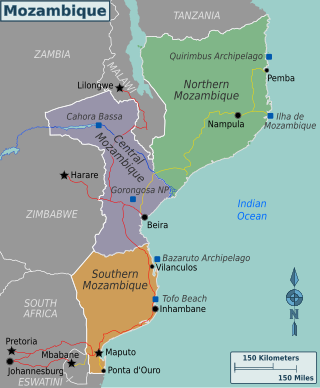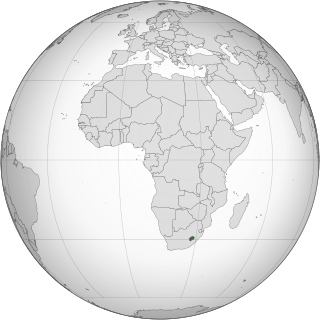
Lesotho, officially the Kingdom of Lesotho, is a country landlocked as an enclave in South Africa. It is situated in the Maloti Mountains and contains the highest mountains in Southern Africa. It has an area of over 30,000 km2 (11,600 sq mi) and has a population of about 2 million.

The economy of Lesotho is based on agriculture, livestock, manufacturing, mining, and depends heavily on inflows of workers’ remittances and receipts from the Southern African Customs Union (SACU). Lesotho is geographically surrounded by South Africa and is economically integrated with it as well. The majority of households subsist on farming. The formal sector employment consist of mainly female workers in the apparel sector. While male migrant laborers work primarily as miners in South Africa for 3 to 9 months and employment in the Government of Lesotho (GOL). Half of the country's population work in informal crop cultivation or animal husbandry.

HIV/AIDS originated in Africa during early 20th century and is a major public health concern and cause of death in many African countries. AIDS rates varies significantly between countries, though the majority of cases are concentrated in Southern Africa. Although the continent is home to about 15.2 percent of the world's population, more than two-thirds of the total infected worldwide – some 35 million people – were Africans, of whom 15 million have already died. Eastern and Southern Africa alone accounted for an estimate of 60 percent of all people living with HIV and 70 percent of all AIDS deaths in 2011. The countries of Eastern and Southern Africa are most affected, AIDS has raised death rates and lowered life expectancy among adults between the ages of 20 and 49 by about twenty years. Furthermore, the life expectancy in many parts of Africa is declining, largely as a result of the HIV/AIDS epidemic with life-expectancy in some countries reaching as low as thirty-nine years.
Robert D. Haas is the chairman emeritus of Levi Strauss & Co., son of Walter A. Haas Jr., and the great-great-grandnephew of the company's founder, Levi Strauss.

Partners In Health (PIH) is an international nonprofit public health organization founded in 1987 by Paul Farmer, Ophelia Dahl, Thomas J. White, Todd McCormack, and Jim Yong Kim.
Following infection with HIV-1, the rate of clinical disease progression varies between individuals. Factors such as host susceptibility, genetics and immune function, health care and co-infections as well as viral genetic variability may affect the rate of progression to the point of needing to take medication in order not to develop AIDS.
The European and Developing Countries Clinical Trials Partnership (EDCTP) is a partnership between the European Union (EU), Norway, Switzerland and developing countries and other donors, as well as the pharmaceutical industry, to enable clinical trials and the development of new medicines and vaccines against HIV/AIDS, tuberculosis, and malaria. The need for global action against these diseases in order to promote poverty reduction has been recognised by the United Nations, the G8, and the African Union, and the program envisioned the provision of €600 million for the period 2003–2007 in order to translate medical research results into clinical applications relevant to the needs of developing countries.
Serosorting, also known as serodiscrimination, is the practice of using HIV status as a decision-making point in choosing sexual behavior. The term is used to describe the behavior of a person who chooses a sexual partner assumed to be of the same HIV serostatus in order to engage in unprotected sex with them for a reduced risk of acquiring or transmitting HIV/AIDS.
Botswana is experiencing one of the most severe HIV/AIDS epidemics in the world. The national HIV prevalence rate among adults ages 15 to 49 is 24.8 percent, which is the third highest in the world, behind Lesotho and Eswatini. HIV/AIDS threatens the many developmental gains Botswana has achieved since its independence in 1966, including economic growth, political stability, a rise in life expectancy, and the establishment of functioning public educational and health care systems.
Sentebale is a registered charity founded in 2006 by Prince Harry and Prince Seeiso of Lesotho. Sentebale helps children and adolescents struggling to come to terms with their HIV status. It provides a safe environment for them to address their mental health amongst their peers, giving them tools and knowledge.
Kick4Life FC (K4L) is the world's first football club exclusively dedicated to social change. Currently playing in the Lesotho Men's Premier League and the Lesotho Women's Super League the club is a registered charity in Lesotho, the UK and the US, and aims to utilise the power of football to change the lives and long-term prospects of young people in Lesotho.
Long-term nonprogressors (LTNPs), sometimes also called elite controllers, are individuals infected with HIV, who maintain a CD4 count greater than 500 without antiretroviral therapy with a detectable viral load. Many of these patients have been HIV positive for 30 years without progressing to the point of needing to take medication in order not to develop AIDS. They have been the subject of a great deal of research, since an understanding of their ability to control HIV infection may lead to the development of immune therapies or a therapeutic vaccine. The classification "Long-term non-progressor" is not permanent, because some patients in this category have gone on to develop AIDS.

HIV/AIDS affects economic growth by reducing the availability of human capital. Without proper prevention, nutrition, health care and medicine that is available in developing countries, large numbers of people are developing AIDS.

HIV/AIDS in Lesotho constitutes a very serious threat to Basotho and to Lesotho's economic development. Since its initial detection in 1986, HIV/AIDS has spread at alarming rates in Lesotho. In 2000, King Letsie III declared HIV/AIDS a natural disaster. According to the Joint United Nations Programme on HIV/AIDS (UNAIDS) in 2016, Lesotho's adult prevalence rate of 25% is the second highest in the world, following Eswatini.

Mozambique is a country particularly hard-hit by the HIV/AIDS epidemic. According to 2008 UNAIDS estimates, this southeast African nation has the 8th highest HIV rate in the world. With 1,600,000 Mozambicans living with HIV, 990,000 of which are women and children, Mozambique's government realizes that much work must be done to eradicate this infectious disease. To reduce HIV/AIDS within the country, Mozambique has partnered with numerous global organizations to provide its citizens with augmented access to antiretroviral therapy and prevention techniques, such as condom use. A surge toward the treatment and prevention of HIV/AIDS in women and children has additionally aided in Mozambique's aim to fulfill its Millennium Development Goals (MDGs). Nevertheless, HIV/AIDS has made a drastic impact on Mozambique; individual risk behaviors are still greatly influenced by social norms, and much still needs to be done to address the epidemic and provide care and treatment to those in need.

Lesbian, gay, bisexual, and transgender (LGBT) persons in Lesotho face legal challenges not experienced by non-LGBT residents. Lesotho does not recognise same-sex marriages or civil unions, nor does it ban discrimination on the basis of sexual orientation or gender identity.

Lesotho's Human development index value for 2018 was 0.518—which put the country in the low human development category—positioning it at 164 out of 189 countries and territories. Health care services in Lesotho are delivered primarily by the government and the Christian Health Association of Lesotho. Access to health services is difficult for many people, especially in rural areas. The country's health system is challenged by the relentless increase of the burden of disease brought about by AIDS, and a lack of expertise and human resources. Serious emergencies are often referred to neighbouring South Africa. The largest contribution to mortality in Lesotho are communicable diseases, maternal, perinatal and nutritional conditions.
The Berlin patient is an anonymous person from Berlin, Germany, who was described in 1998 as exhibiting prolonged "post-treatment control" of HIV viral load after HIV treatments were interrupted.
Empilisweni District Hospital is a Provincial government funded hospital for the Senqu Local Municipality area in Sterkspruit, Eastern Cape in South Africa. Empilisweni is a level 1 hospital situated near the Lesotho and Free State borders with 93 usable beds. It forms a cluster with Umlamli Hospital, Lady Grey and Cloete Joubert Hospitals.

In 2017, 1.1 million women were living in Lesotho, making up 51.48% of the population. 33% of women are under 15 years of age, 61.4% are between 15 and 64 years old and 5.3% are over 64 years old. They received full legal status in 2008 with the passage of The Lesotho Bank Savings and Development Act of 2008. Women in Lesotho die at a disproportionate rate from HIV/AIDs. Historically, women have wielded power as heads of households, with control over household financial decisions. The government has taken steps to ensure more equal representation of genders in government with quotas, and women in Lesotho are more highly educated than men. Still, domestic abuse, sexual violence, lack of social mobility, and aforementioned health crises are persistent issues. Social and economic movements, like the mass immigration of men to South Africa, and the rise of the garment industry, have contributed to both the progress and problems facing women in Lesotho today.









